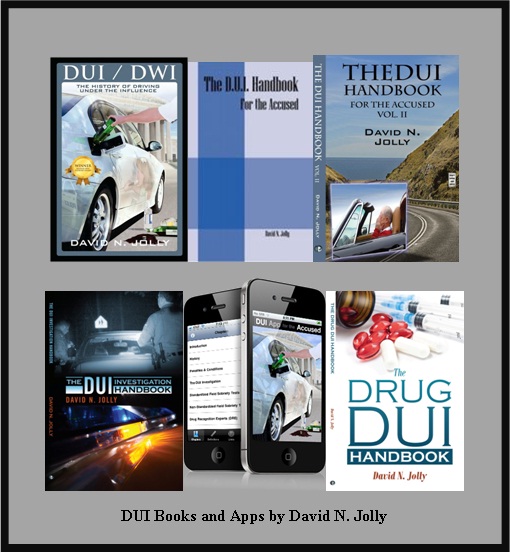Everett Marysville Snohomish County Drunk Driving DUI Lawyer: The Drug DUI Handbook
Everett Marysville DUI / DWI / Drunk Driving Lawyers- Experienced, Successful, Affordable
(425) 493-1115
The following is an excerpt from the upcoming book “The Drug DUI Handbook,” due to be published in September, 2011. Jolly, David N. The Drug DUI Handbook. Outskirts Press Inc. (2011)
General Criticisms of SFSTs
Proponents of these studies conclude that the standardization of FSTs has produced more accurate and reliable determination of possible DUI drivers. However, there have been many critics. The NHTSA studies are not peer-reviewed, thereby skipping an important review of the study itself. The peer review process enables other scientists to critique the experimental method and conclusions reached by the article’s author(s). Research studies design and criterion must also meet generally acceptable scientific standards. To wit, a study such as the ones conducted to test SFSTs must include a control group and eliminate variables that can distort results. The tests relied on by NHTSA fail to do this according to NHTSA’s critics.
Another criticism of the SFSTs is that they cannot be considered reliable until the mean and standard deviation of normal performance is established. Interestingly no controlled (NHTSA sponsored) studies have been completed to determine the normal range of SFST performance for sober individuals. However, there is one study that examined the concept that normal, sober individuals may be considered impaired based either on field sobriety tests or normal abilities tests. In the study, 21 sober participants (between 21-55 years of age, no known physical disabilities, and of normal weight) were videotaped while performing field sobriety tests and fourteen police officers were assigned to view their performance. Cole, S., Nowaczyk, R. Field Sobriety Tests: Are they Designed for Failure? Percept Mot. Skills. Page 79 (1994)
After examining the performances, the officers in the study were asked to determine if the participant was impaired. Forty-six percent of the officers declared that a sober participant in the study had “too much to drink” based on the FST performance. In this study, only 3 participants were determined to be sober by all officers, although every one of the participants was in fact, sober. Id. Other arguments against the validity of the SFSTs come from those who believe that these tests do not and cannot prove that the subject was driving under the influence. Importantly no individual from NHTSA, DOT , or the NHTSA commissioned researchers have ever claimed that the SFSTs are direct indicators of actual driving impairment. Stuster and Burns recognized the limitations and stated: “[d]riving a motor vehicle is a very complex activity that involves a wide variety of tasks and operator capabilities. It is unlikely that complex human performance, such as that required to safely drive an automobile, can be measured at roadside. The constraints imposed by roadside testing conditions were recognized by the developers of NHTSA’s SFST battery. As a consequence, they pursued the development of tests that would provide statistically valid and reliable indications of a driver’s BAC, rather than indications of driving impairment. Stuster, Jack and Burn, Marcelline. Validation of the Standardized Field Sobriety Test Battery at BACs Below .10 Percent. DOT - HS-808-839 6. Page 28 (1998)
Another study declared that “even valid, behavioral tests are likely to be poor predictors either of actual behind-the wheel driving.” Snapper, K.J., Seaver, D.A.., Schwartz, J.P. An Assessment of Behavioral Tests to Detect Impaired Drivers. Final Report, DOT HS-806-211. Pages 2-7 (1981)
For information on your Washington State DUI / Drunk Driving, Snohomish County DUI, King County DUI, Skagit County DUI, Island County DUI or Whatcom County DUI please contact our Washington State DUI drunk driving attorneys for a free consultation at 425-493-1115, email us at david@davidjollylaw.com, or check out our main website at http://www.washdui.com or www.mukilteodui.com, www.everett-dui.co, www.marysville-dui.com, www.dui-bothell.com, or www.anacortesdui.com. We represent DUI clients in every court in Western Washington including Seattle DUI cases, Kirkland DUI cases, Redmond DUI cases, Shoreline DUI cases, Lynnwood DUI cases, Everett DUI cases, Mukilteo DUI cases, Marysville DUI cases, Mt. Vernon DUI cases, Anacortes DUI cases, and Bellingham DUI cases.
Author of The DUI Handbook for the Accused, DUI/DWI: The History of Driving Under the Influence, The DUI Investigation Handbook and The Drug DUI Handbook.
Everett Marysville DUI / DWI / Drunk Driving Lawyers- Experienced, Successful, Affordable (425) 493-1115


No comments:
Post a Comment